

The International Conference on the Foundations of Digital Games (FDG) is a major international event. It seeks to promote the exchange of information concerning the foundations of digital games, technology used to develop digital games, and the study of digital games and their design, broadly construed. The goal of the conference is the advancement of the study of digital games, including but not limited to new game technologies, critical analysis, innovative designs, theories on play, empirical studies, and data analysis.
FDG 2018 will include presentations of peer-reviewed papers (with rebuttal process), invited talks by high-profile industry and academic leaders, panels, workshops, and posters. The conference will also host a game competition, tech demo session, and a doctoral consortium. This year’s FDG conference will nominate two papers with honorable mention and one best paper from each track.
FDG 2018 is organized in-cooperation with ACM SIGAI, SIGCHI, and SIGGRAPH.

FDG 2018 will accept communications in the form of full papers, short papers, workshops, posters, panels, games and demos. Full papers, short papers, and posters will appear in ACM’s digital library and will also be reachable from the conference website. High quality submissions are expected and will be rigorously reviewed for their technical merit, significance, clarity and relevance to the advancement of digital game research.
The date for the conference is 7-10 August 2018, with the following key dates:
DEADLINE EXTENDED
DEADLINE EXTENDED
DEADLINE EXTENDED
DEADLINE EXTENDED

José Font is a tenured assistant professor at Malmö University and holds a PhD in artificial intelligence from the Universidad Politécnica de Madrid. His research focuses on artificial intelligence and computational intelligence in games, exploring the ways in which AI can be a productive and creative tool during the video game development process, such as procedural content generation and mixed-initiative creative tools. He is also active in gamification, e-learning, and purposeful games, as well as former manager of the Bachelor’s degree in Software Engineering at U-tad.
Website: about.me/josefont
Carl Magnus is a tenured assistant professor at Malmö University, and responsible for the Smart Living application area within the Internet of Things and People research center. He holds a PhD in context-aware systems from the Computer Science and Information Systems Department at the University of Limerick, Ireland. While Carl has published within digital games, the majority of his research has been published outside the digital games sphere, where he manages projects in close collaboration with international industry partners developing mobile and wearable devices and services. This has included gaming, entertainment, and well-being based implementations to understand how human-technology relationships are affected and change over time, as well as how intelligent system design can adapt to this.
Steve Dahlskog is a tenured assistant professor at Malmö University. His main research interest include procedural content generation in games and game AI. Steve holds a PhD in Computer Science and is the program manager of the game developer program at the Department of Computer Science and Media Technology. He is also a well-known community member in the Malmö gaming sphere.
Johan is an IT engineer at Malmö University, who also works as a teacher and technical lab manager. He holds an MSc in Computer Science, his thesis exploring AI-driven procedural content generation in mixed-initiative game development tools.
Christoph Salge is a Marie Curie Global Fellow, currently on secondment to New York University. His project, INTERCOGAM, is aimed at using information-theoretic intrinsic motivations to evaluate procedurally generated game content. He is generally interested in the intersections between games, AI and philosophy. He holds a PhD from the University of Hertfordshire in “Information Theoretic Models of Social Interaction.”
Website: homepages.herts.ac.uk/~cs08abi
Sebastian Deterding is a designer and researcher working on playful and gameful design for human flourishing.
Website: codingconduct.cc
Sebastian Risi is an Associate Professor at the IT University of Copenhagen where he is part of the Center for Computer Games Research and the Robotics, Evolution and Art Lab (REAL). His interests include computational intelligence in games, neuroevolution, evolutionary robotics and human computation. Risi completed his PhD in computer science from the University of Central Florida. He has won several best paper awards at GECCO, EvoMusArt, IJCNN, and the Continual Learning Workshop at NIPS for his work on adaptive systems, the HyperNEAT algorithm for evolving complex artificial neural networks, and music generation. He was a co-founder of FinchBeak, a company that focused on casual and educational social games enabled by AI technology.
Amy K. Hoover is an assistant professor at New Jersey Institute of Technology in Newark, New Jersey. After receiving her Ph.D. in computer science at the University of Central Florida where she was a National Science Foundation Graduate Research Fellow, she was a postdoc at the Institute of Digital Games in Malta and with the Playable Innovative Technolgies group at Northeastern University in Boston. Her research interests include computational creativity and artificial intelligence and games. Amy has received two Best Paper Awards at EvoMUSART and Genetic and Evolutionary Computation Conference, and was a Runner-Up for the Best Paper Award at FDG 2017. .
Website: amykhoover.com
Diego Perez-Liebana is a Lecturer in Computer Games and Artificial Intelligence at the University of Essex (UK), where he achieved a Ph.D. in Computer Science (2015). His research focuses on Reinforcement Learning and Evolutionary Computation in Game AI. He is author of more than 50 papers at main conferences and journals, including IEEE CIG, IEEE Transactions on Evolutionary Computation and IEEE Transactions on CI and AI in Games. He has organized several international competitions on Game AI for IEEE CIG conferences, such as the Physical Travelling Salesman Problem and the GVGAI Competition. He also served as competitions chair at IEEE CEEC 2015, 2016, Track Chair at nucl.ai 2015 and 2016, IEEE CIG 2016 and 2018, and he’s member of the CIS Student Games-Based Competitions Sub-Committee. He has several years of experience in the videogames industry, working as a games programmer (Revistronic; Spain), with titles published for both PC and consoles and as an AI for videogames developer (Game Brains; Ireland). He has lectured several modules about games development and game AI.
Website: www.diego-perez.net
Annika is a ‘research through design’ academic with a background in computer science and Human-Computer Interaction, who has been researching play and games for about fifteen years. Annika has an extensive background in researching pervasive games, and more recently she has been involved with studying interactive and physical play design for children, adults and families.
Website: katalog.uu.se/empinfo/?id=N13-228
Staffan Björk is a full professor at Göteborg University. He is co-author of the book “Patterns in Game Design” together with Jussi Holopainen. He has been active in promoting user-centred research and game research, being chair of the Swedish HCI organization (STIMDI) between 2004-2006, being one of the founders of the Digital Games Research Association, and co-organizing events such as Spelforum 2003, PerGames 2006, Pergames 2007, Visual Forum 2009, DiGRA 2014-2016.
I'm a game developer, teacher, and game/artificial intelligence researcher based out of Northeastern University and Die Gute Fabrik. My research focuses on using AI in the service of game design. With a background in game design and psychology, I am interested in building AI player models and applying these in game development, testing, and game play and using them to understand players and the craft of making games. I study small-scale game development processes with a strong interest in tools and ecologically valid playtesting. As a co-owner of independent game development studio Die Gute Fabrik, I focus on production, design, and programming of games that are synaesthetic, offbeat, and above all, personal.
Website: christoffer.holmgard.org
Henrik Warpefelt (PhD) is an assistant professor at the Department of Game Design at Uppsala University. His research is centered around non-player characters and generative game narratives.
Annakaisa Kultima is a lecturer at Aalto University School of Arts, Design and Architecture and a researcher at the University of Tampere. She has been teaching and studying game design and development since 2006 in three different universities, Finland and Sweden. As a visiting lecturer she has travelled around the world including universities in US, China, Denmark, Korea and Japan. Her research is concentrating on the game development cultures, industry trends and games as created. She is an active participant of the game ecosystem in Finland and internationally judging in game competitions, running game jams as well as curating exhibitions on games. She is also the head of non-profit organization Finnish Game Jam advocating the game making hobby and indie cultures in Finland.
Website: aakoosgamelab.com
Senior User Researcher and Data Scientist at Massive Entertainment, a Ubisoft studio. Dr. Alessandro Canossa has been straddling between the game industry and academia for many years.
As Associate Professor at Northeastern University he employed psychological theories of personality, motivation and emotion to design interactive scenarios with the purpose of investigating individual differences in behavior among users of digital entertainment. His research focuses heavily on these topics: a) developing behavioral analysis methodologies that are able to account for granular spatial and temporal events, avoiding aggregation; b) design and development of visual analytics tools that can enable any stakeholder to produce advanced statistics, predictions and datamining reports.
As Senior User Researcher and Data Scientist at Massive Entertainment he enjoys tremendously investigating occult behavioral patterns and is happiest when he can triangulate data-driven insights with surveys and lab observations to provide reports for productions teams. At the same time, he is involved with the Live Ops team to improve data culture and devise novel player segmentation approaches. He also established a workgroup to identify the best processes for transferring knowledge from academic research to industry practices and to bring Ubisoft at the cutting edge of the game analytics culture.
Simon Niedenthal is an Associate Professor of Interaction Design at Malmö University in Sweden. Since 2010 he has explored the history and potentials of smell-enabled gaming and the playful uses of scent. His scholarly writings in the area of olfaction include “Skin Games: Fragrant Play, Scented Media and the Stench of Digital Games” and “Vile Perfume: The Future of the Zombie in the Smellscape of Gaming.” He has also written about the experience of sensory boundaries in motor racing and fireworks games.
Simon’s background is eclectic: he holds a B.F.A. in photography, an M.A. in Medieval English literature, and a Ph.D. in Interaction design. In 2008 he defended his Ph.D. thesis “Complicated Shadows: the Aesthetic Significance of Simulated Illumination in Digital Games” in the area of game lighting and its effect upon the emotions and behavior of the player.
Simon is currently engaged in the four-year Stockholm University research project “Nosewise”, which aims to explore the potential of smell-enabled gaming to enhance cognitive capacity in the elderly.
I am a PhD candidate in interaction and game design at Malmö University (Sweden). In my research I take a critical approach to the treatment of animals in society and investigate how the design of artefact that mediate playful, joyful, or surprising encounters between animals and humans can inspire us to imagine alternative - non-speciesist - futures.
Website: michellewesterlaken.com
Hanna Wirman (PhD) is an assistant professor at the School of Design of the Hong Kong Polytechnic University where she leads the MSc study stream in game development. Her research interests focus on marginal and critical ways of playing and making games, including design and research of animal play. Hanna serves on the board of Chinese DiGRA and on the DiGRA Executive Board. She has lead the Global Game Jam Hong Kong since 2013.
Website: miguelsicart.net
I'm working on artificial intelligence techniques for making computer games more fun, and on games for making artificial intelligence smarter. I ask what AI can do for games, and what games can do for AI.
I want to make computer games adapt to their players through finding out what players want (whether they know it or not) and creating new game levels, challenges or rules that suit the players. Related to this is the challenge of making sense of large amounts of data generated by computer games, and on assisting human game designers in creating great game experiences. I also want to make opponents and collaborators in games more intelligent and believable, research that has applications far outside of computer games. I believe games, in particular video games, are perfect test-beds for AI methods. But it is important that you test your algorithms not just on a single game, but on a large number of games, so you focus on general intelligence and not just solving a single problem.
Website: julian.togelius.com
Antonio José Planells de la Maza (PhD), researcher and professor at Tecnocampus-Pompeu Fabra University. He has studied Law, Media Studies and the Master of Applied Research to Mass Media at University Carlos III of Madrid and the Master of Advances Studies in Social Communication at University Pompeu Fabra (Barcelona, Spain). His main research interests are related to fictional and possible worlds, ideology and character design.
Anton Tibblin is a lecturer at the faculty of technology and society at Malmö University, where he serves as program director for the information architecture program. His main academic interests include web technologies and innovations.
Enrique Morales Corral holds a PhD in Communication Sciences and Sociology at UCM (Universidad Complutense de Madrid) and a degree in Sociology at UPNA (Universidad Pública de Navarra). His teaching career is currently taking place at U-TAD, a university centre attached to the Universidad Camilo José Cela (UCJC), where he teaches various subjects, such as Digital Society and Game Theory. His research career began with a predoctoral fellowship FPI of the UCM, where he joined the MDCS research group led by UCM Professor Dr. Jose Luis Piñuel. In 2013 he completed a research stay at Westminster University. His main lines of research focus on videogames, digital society, climate change, communication and new technologies..
Website: goo.gl/CAAp5A
Alberto Alvarez is a PhD student from the faculty of technology and society at Malmö University. His research interests are on procedural content generation for games and how the different generated content can affect and interact with each other, computational intelligence for games, evolutionary algorithms and, the development of believable and reactive agents. He holds an MSc in games technology from the IT University of Copenhagen and a Bachelor in game design and development from ESNE, Madrid.
Website: aeaublog.wordpress.com
Jialin Liu is a Postdoctoral Research Associate at Queen Mary University of London (QMUL, UK) and one of the founding members of the Game AI research group created in August 2017. Before joining QMUL, she was a Senior Research Officer at the Games and AI research group of University of Essex (UK) between March 2016 and July 2017. Jialin received her Ph.D.in Computer Science from the University Paris-Saclay & Inria Saclay (France) in 2016. Her research interests include general game playing, robust game playing in adversarial games, automatic game design, black-box noisy optimization and portfolio algorithms. Jialin is chairing the IEEE Computational Intelligence Society Student Games-Based Competitions Sub-Committee and also serves in the Games Technical Committee, Webinars Sub-Committee, Women in Computational Intelligence Sub-Committee and Young Professionals Sub-Committee. She serves as Program Co-Chair at IEEE CIG18.
Website: www.liujialin.tech

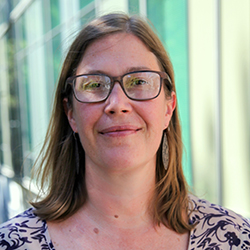 Katherine Isbister is a full professor in the University of California, Santa Cruz's Department of Computational Media, where she is Director of the Social and Emotional Technology Lab. Her research at the intersection of Human Computer Interaction and Games focuses on designing playful experiences that heighten social and emotional connections, toward innovating design theory and technological practice. Isbister’s most recent book from MIT Press is How Games Move Us: Emotion by Design, which won an American Library Association Outstanding Academic Title Choice award. Prior books include Game Usability, and Better Game Characters by Design. Her research has been covered in Wired, Scientific American, and many other venues. She was a recipient of MIT Technology Review's Young Innovator Award, and is a Founding Fellow of HEVGA as well as an ACM Distinguished Scientist.
Katherine Isbister is a full professor in the University of California, Santa Cruz's Department of Computational Media, where she is Director of the Social and Emotional Technology Lab. Her research at the intersection of Human Computer Interaction and Games focuses on designing playful experiences that heighten social and emotional connections, toward innovating design theory and technological practice. Isbister’s most recent book from MIT Press is How Games Move Us: Emotion by Design, which won an American Library Association Outstanding Academic Title Choice award. Prior books include Game Usability, and Better Game Characters by Design. Her research has been covered in Wired, Scientific American, and many other venues. She was a recipient of MIT Technology Review's Young Innovator Award, and is a Founding Fellow of HEVGA as well as an ACM Distinguished Scientist.
Computation is seeping deeper and deeper into everyday life, altering not just how we work and communicate, but also how we play together. The gameplay environment is increasingly a hybrid of the physical and the digital, opening new possibilities and design spaces. Katherine Isbister’s research group is known for building technology prototypes that explore and also shape the future of social play*. In this keynote, she will discuss recent technical prototypes her group has built in close collaboration with larp (live action role play) designers, using these wearables as thought objects to explore values and techniques for creating tech that supports social play. Isbister will also discuss recent work in social VR and in livestreaming environments such as Twitch, aimed at developing best design practices for supporting the future of playing together. The audience should leave the talk with a broader sense of the future possibility space for social play, and points for discussion about the role technology may take in better supporting playing (and being) together.
Date and time: August 8, 9:00am - 10:00am
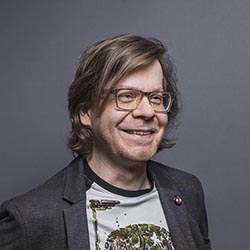 Aki, Ph.D., is a game industry veteran and an academic. Since 2001, Aki’s career has included a number of mobile and online game studios and three universities in three countries. Currently he leads game design at Sheffield Hallam University and runs his consultancy Game Futures, which specialises in helping game companies to use foresight thinking for their future product strategies. His recent own research and development in games has focused into Virtual and Augmented Realities, both from the perspective of content trends and mapping the emerging design space within VR. His talk at FDG will focus on the new paradigm of game design for VR.
Aki, Ph.D., is a game industry veteran and an academic. Since 2001, Aki’s career has included a number of mobile and online game studios and three universities in three countries. Currently he leads game design at Sheffield Hallam University and runs his consultancy Game Futures, which specialises in helping game companies to use foresight thinking for their future product strategies. His recent own research and development in games has focused into Virtual and Augmented Realities, both from the perspective of content trends and mapping the emerging design space within VR. His talk at FDG will focus on the new paradigm of game design for VR.
In comparison to spaces on flat screens and mental images of space we coin through consuming media, the unique experiential aspect Virtual Reality enables is tangible sense of presence. While fidelity of virtual presence has been researched in academic VR laboratories since the 1990s, there has been less focus on how various design choices can lead to different flavors of presence, and how presence could be broken down into categories and patterns to inform creative practices, such as game design. Aki Järvinen shares his work into mapping presence design across existing VR games and experiences. He contextualises the emerging VR design space to the trend of Spatial Computing and introduces his practice-based research project, Palace of Presence, which gives the resulting design framework a tangible form as a VR application.
Date and time: August 9, 9:00am - 10:00am
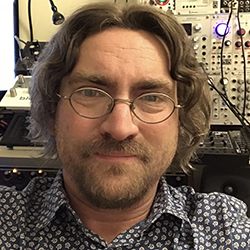 James Newman is Research Professor at Bath Spa University and curator at the National Videogame Foundation where he works on game preservation, exhibition and interpretation. Over the past 20 years, James has written widely on aspects of videogames, fandom and the cultures of play, media histories and game preservation and has spoken across the world at events for academics, policy-makers, game developers and players. James’ books on games and gaming include Videogames; Playing with Videogames; and Best Before: Videogames, Supersession and Obsolescence (for Routledge); and 100 Videogames and Teaching Videogames (for BFI Publishing). Most recently, he co-authored A History of Videogames 14 consoles, 5 computers, 2 arcade cabinets ... and an Ocarina of Time (Carlton, 2018) which draws on the collections of the UK’s National Videogame Arcade; and a White Paper on international videogame preservation practice and policy funded by British Academy and Leverhulme Trust. James is currently writing books on videogame spectatorship and on the histories of early videogame sound and music.
James Newman is Research Professor at Bath Spa University and curator at the National Videogame Foundation where he works on game preservation, exhibition and interpretation. Over the past 20 years, James has written widely on aspects of videogames, fandom and the cultures of play, media histories and game preservation and has spoken across the world at events for academics, policy-makers, game developers and players. James’ books on games and gaming include Videogames; Playing with Videogames; and Best Before: Videogames, Supersession and Obsolescence (for Routledge); and 100 Videogames and Teaching Videogames (for BFI Publishing). Most recently, he co-authored A History of Videogames 14 consoles, 5 computers, 2 arcade cabinets ... and an Ocarina of Time (Carlton, 2018) which draws on the collections of the UK’s National Videogame Arcade; and a White Paper on international videogame preservation practice and policy funded by British Academy and Leverhulme Trust. James is currently writing books on videogame spectatorship and on the histories of early videogame sound and music.
With colleagues from the National Media Museum, James co-founded the National Videogame Archive in 2007 and in 2017 founded the Game Sound Archive which is a collaboration with the British Library. In addition to working on the GameCity international games festival since its launch in 2006, James is director of the All Your Bass videogame music festival. He is an avid collector of synthesisers and an enthusiastic, but not very good, keyboard player.
“To me, watching another person play video games is like going to a restaurant and having someone eat your food for you.”
(Jimmy Kimmel Live, 27 August 2015)
If there is one thing that distinguishes videogames from other media forms surely it is their interactivity. To play a videogame is to directly effect change on the course of events whether by manoeuvring a character or avatar or by manipulating a set of variables in a simulation. For all their diversity of format, structure and interface, the unifying feature of videogames is their focus on participation, being, and doing.
Quite rightly, academic game studies has spent many years honing analyses and methods that accommodate these facets of videogames. As Consalvo, Mitgutsch and Stein (2013: 4) note in their Sports Videogames collection, ‘...although audiences of all types are “active” in the many ways delineated by Fiske (1987), players—or perhaps the play position—is unique in that the player must work to (co-)construct the object of interest—the videogame.’ Indeed, we might argue that the field has defined itself through its placement of players and their experiences at its heart. More than a decade on, Aarseth’s (2003) crucial discussion of the obligation to understand gameplay in order to do game studies remains most easily tackled by grasping a controller and seeking to attain at least some degree of expertise as a player.
Today, however, quite what it means to be a ‘player’, or what constitutes the distinctive ‘play position’, has never been more complicated, contested and confusing – so much so that it need not involve touching a controller at all, far less becoming an accomplished performer. And this is, at least in part, because gameplay spectatorship — ‘watching another person play video games’ as Jimmy Kimmel joked — is such an incontestably mainstream part of videogame culture.
The emergence of new technologies, platforms and services for sharing gameplay experience draws into sharp relief the narrowness of our current definitions of play and demands a fundamental reconsideration of our methods and approaches. However, although Twitch, the recent boom in livestreaming and personal gameplay archiving, and the increased visibility of e-sports make the phenomenon of gameplay spectatorship harder to ignore (and certainly each has a transformative effect on modes of watching and performing), the presentation argues that spectatorship has always been a fundamental yet under-appreciated part of gaming.
Aarseth, E. (2003) ‘Playing Research: Methodological approaches to game analysis’, DAC, Melbourne (RMIT).
Consalvo, M., Mitgutsch, K., and Stein, A. (Eds) (2013) Sports Videogames, Abingdon: Routledge.
Fiske, J. (1987) Television Culture. London: Routledge.
Date and time: August 10, 9:00am - 10:00am

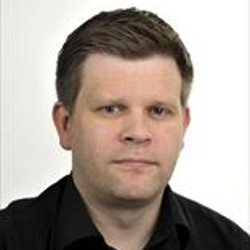 Stefan worked as a computer programmer for several years. He studied mathematics (M.Sc.) and later continued with artificial intelligence and computer science for PhD until he took the position of a director of Risk Analytics and Modelling at Islandsbanki – one of the three major banks in Iceland. With his PhD studies he was also a part-time lecturer in mathematics at Keilir Institute of Technology and Reykjavik University. In 2015 he joined King as a senior data scientist and later became AI Research Lead.
Stefan worked as a computer programmer for several years. He studied mathematics (M.Sc.) and later continued with artificial intelligence and computer science for PhD until he took the position of a director of Risk Analytics and Modelling at Islandsbanki – one of the three major banks in Iceland. With his PhD studies he was also a part-time lecturer in mathematics at Keilir Institute of Technology and Reykjavik University. In 2015 he joined King as a senior data scientist and later became AI Research Lead.
Stefan will present how King uses AI in games, both in launched games like Candy Crush Saga and Candy Crush Soda Saga, as well as in games in development. He will explain how King builds AI-agents with deep learning from hundreds of millions of tracked player decisions and will discuss King’s latest research on player modelling, reinforcement learning and automatic level generation.
Date and time: August 9, 4:30pm - 6:00pm


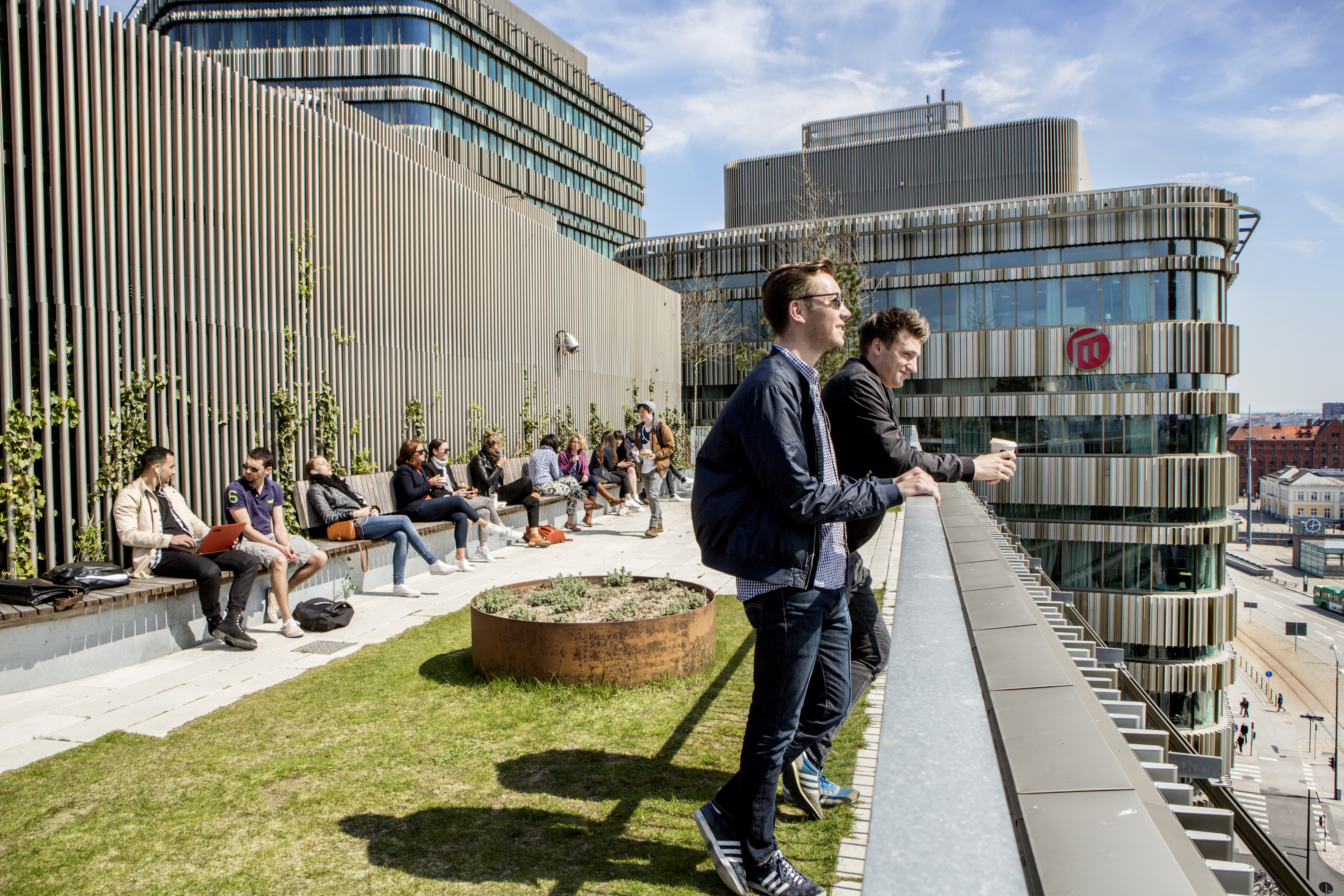



The Faculty of Technology and Society at Malmö University is the host for the venue. Malmö University is a forward-looking institution of higher education that fosters multi- and cross-disciplinary actions based on four core values: diversity, creativity, quality, and commitment to the community.
The venue is located in the recently built and highly modern buildings Niagara and Orkanen. The buildings are located next to each other in the Western Harbour area (Västra Hamnen). Historically, the area was an important industrial hub but has over the last decades become one of the most exclusive neighborhoods in Malmö - with a mix of companies and housing to provide a vibrant experience. The area is also known as "the City of Tomorrow" and is the first district in Europe to be carbon dioxide neutral. Given the very short walk into the central parts of Malmö and the excellent public transport system, the location is also good for exploring the city and surrounding areas. The selected date for the event ensures a good availability of the spaces in the buildings as courses start early September
The Restaurant Niagara, located on the ground floor of the Niagara building, will host lunches and coffee breaks during the four days of the conference. The restaurant is happy to accommodate most diets and allergies, with friendly staff who always make sure to help out with any questions.

Malmö is Sweden's most multicultural city, as well as an established center for the internationally well-regarded Swedish game development industry. Malmö is a vibrant city, especially during the yearly Malmö Festival (free admissions, and the week after the FDG conference), turning the city into one of the biggest cultural hubs and touristic attractions in Scandinavia. Please refer to the sections Malmö and Accessibility for a more detailed description of the city, as well as the many options to get to it from an international perspective. Direct flights to the Copenhagen airport is available from most major hubs, and the trains to Malmö Central Station is located within the airport.
The compactness of Malmö city centre offers not only a pleasant ambience and delightful atmosphere, it also enables you to explore the whole of the city even if you are only here for a short time. Most hotels and conference facilities are located within walking distance of the city centre, which means that you are never far from restaurants, cultural activities, entertainment and picturesque parks. The city's buses and trains run frequently and punctually, and there are plenty of taxis. The fact that most Malmö residents speak good English is another plus.

Malmö is just 20 minutes from Scandinavia's largest airport, Copenhagen Airport. Malmö Airport and Copenhagen Airport together offer direct flights to 142 destinations throughout the world. And once you land, onward travel is easy too – trains from Copenhagen Airport to Malmö run every twenty minutes, and buses run continuously from Malmö Airport, stopping at numerous points in central Malmö.
Most international travelers should choose to fly in through Copenhagen Airport. For people traveling fom Central or Eastern Europe, Malmö Airport might prove to be a better choice. Don't be fooled by the fact that Malmö is a Swedish city: Stockholm is far, far away. Don't fly there.
Getting from Copenhagen Airport to the venue is a breeze. Board the train at the airport and disembark 25 minutes later at Malmö Central - quite literally on the university's doorstep.

Hotels are plentiful in the city center, starting at $60 per night. We recommend a closer look at Clarion Hotel & Congress Malmö Live, which is situated just across the street from the venue. You will receive a booking code for a reduced price for this hotel upon registration.
Looking for something a bit more affordable? Have a look at STF Malmö City Hotel & Hostel or simply browse Airbnb for some great deals.

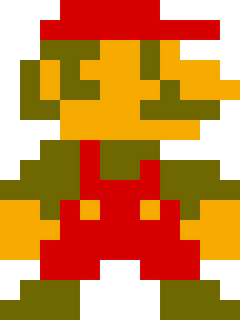
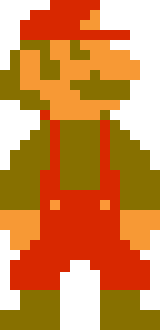
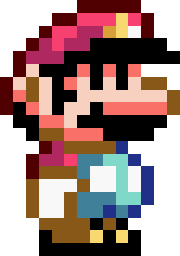
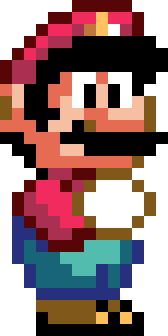


Round 1 of the travel applications have now been decided, and the applicants will shortly receive an email from us.
Round 2 of applications are now open (deadline Thursday Aug 2). Please note that we are open for non-student applications even students (PhD or earlier) are given priority. We hope to have a quick decision in case traveling to FDG hinges upon this funding. Thus, please indicate if this is the case in your application, so we can try to speed the decision up as much as possible.
Round 3 of applications may still be opened at the conference. We will update more about this during the conference if this is the case.
FDG18 are now happy to announce travel grants will be available to apply for. The application process is straight forward, and we hope to see many applicants! As is often the case with travel grants, these are offered to support promising young scholars to attend the conference by reimbursing some of the associated costs.
Applicants must have a contribution accepted at FDG18 (for the main conference or one of the workshops or the doctoral consortium). The travel grant program is open to all scholars attending, but strong preference will be given to PhD, Masters and Bachelor students.
The amount will depend on the number of valid applications we receive, and will be an equal amount for all who are awarded a grant. While subject to final decision by the organizing team, we expect an amount equal to or above the registration fee. The reimbursement may be used for any of the costs you have associated with the travel, however.
Participants interested in applying for a travel grant should send this to Carl Magnus and José. In no more than 500 words total, please include the following items:
Applications will be accepted until July 23rd, 2018. If we still have funds after this time, we may open for additional late applications.
Any discount codes are only valid and usable during the FDG18 conference. The travel grants are available as support to game scholars that do not have other funding options for attending FDG18. The expectation is thus that well funded scholars use their regular funding, to ensure that the travel grants go to those that have the greatest needs. We recognize that there are many different funding situations, and thus leave it to each applicant to use their best judgment concerning this issue.
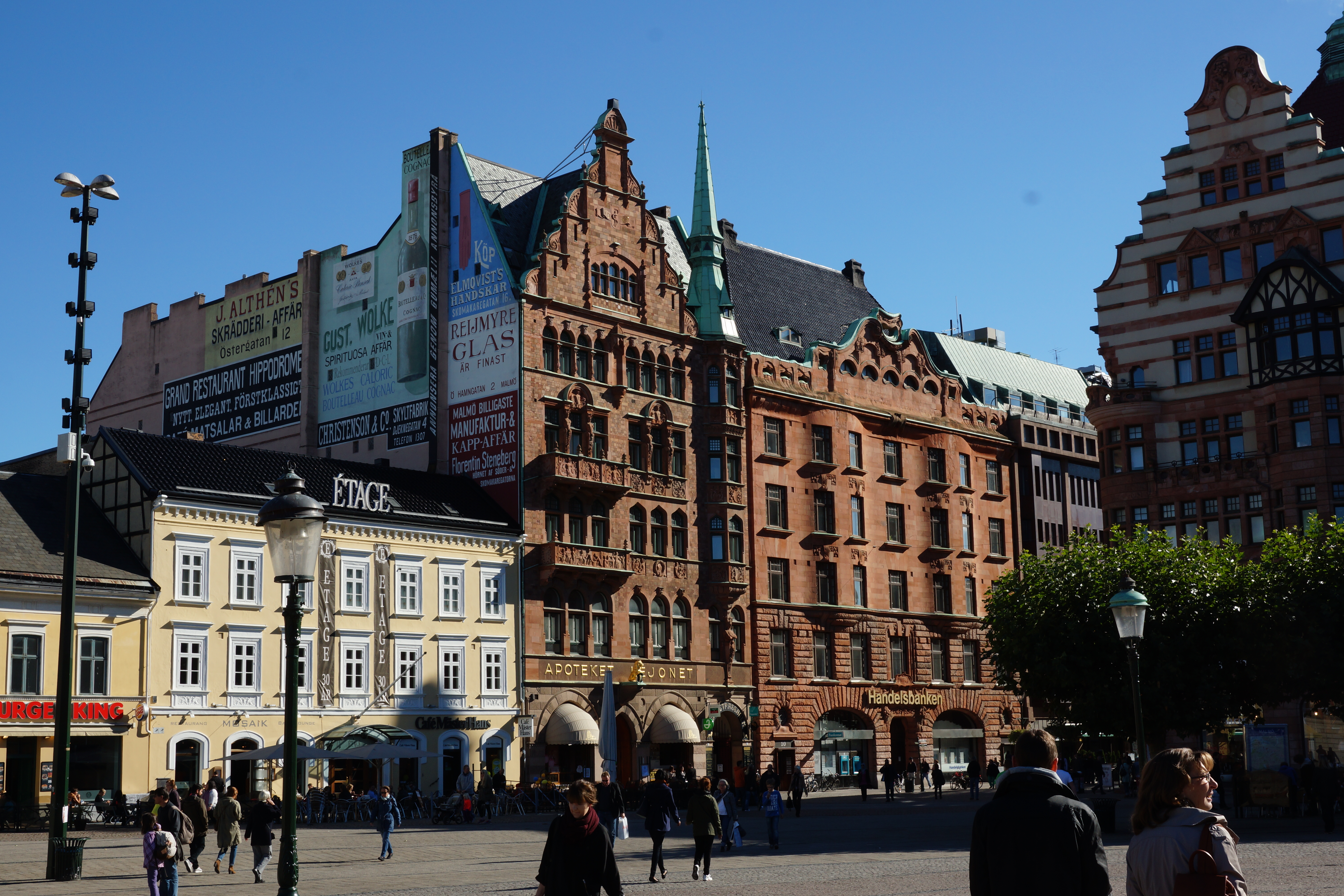


The conference program is comprised of the following events:
View the Foundations of Digital Games 2018 schedule & directory.
Social Program
The social program for the conference is comprised of the following events:
The Malmö Festival is scheduled to start the same day as the conference ends, which offers attendees the possibility to extend their visit in order to enjoy one of the biggest cultural events and touristic attractions in Scandinavia during the summer. We strongly encourage taking the time to enjoy the free admissions festival with its many music stages, events, and exciting food offerings. Please refer to the Discover Malmö section in order to get a good overview of the cultural activities that can be enjoyed while staying in Malmö. In principle, anyone living in Malmö will also be more than happy to share tips on their hidden gems, suggestions for restaurant, and any other questions attendees may have. People in the town are known for their loyalty to the city, and take pride in helping visitors.